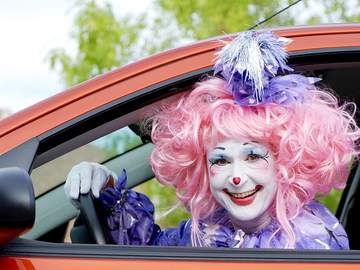
‘Listless’
Listless spiked in lookups last week, after presidential aspirant Ron DeSantis referred to Trump supporters as vessels of this type.
DeSantis defends ‘listless vessels’ remark about Trump supporters after backlash
— (headline) NBC News, 22 Aug. 2023
Listless is an adjective meaning “characterized by lack of interest, energy, or spirit"; the sense of vessel presumably intended by DeSantis is one that we define as “a person into whom some quality (such as grace) is infused.”
The appearance of this relatively obscure word has raised the following urgent question: if one can be listless, can one also be listful? Yes! Does listful mean the opposite of listless? No! This is, after all, the English language, a vengeful and capricious entity who specializes in misdirection.
Listful is an archaic word meaning “attentive”; the list portion of this word means “to give ear, to listen,” and comes from the Middle English listen. Listless, however, comes from a different sense of list (which is probably also derived from listen), one that means “desire, inclination, craving.”
‘Retribution’
Retribution had a busy week after Vladimir Putin appeared to have served up a large portion of this to a man who recently attempted a coup against him.
In July, William J. Burns, the C.I.A. director, said that a “complicated dance” with Mr. Putin had developed … But Mr. Burns predicted that Mr. Putin would move against Mr. Prigozhin … “Putin is the ultimate apostle of payback. So I would be surprised if Prigozhin escapes further retribution for this.”
— Anton Troianovski, The New York Times, 23 Aug. 2023
We define the relevant sense of retribution as “something given or exacted in recompense; especially: punishment.” The word is roughly synonymous with payback, which is fitting, as it comes from the Latin retribuere, meaning “to pay back.”
‘Clown car’
Clown car spiked in lookups (as it often does during the primary season of a presidential election) just before the first debate of Republican presidential candidates.
The circus is back in town—let’s welcome the clown car. Eight contenders for the Republican nomination for president will face off in a debate this evening on Fox.
— David Ramsey, Arkansas Times, 23 Aug. 2023
Clown car has a literal meaning (“a small car used in a circus act during which an implausibly large number of clowns emerge from the car for humorous effect”) and a figurative one (“often used figuratively in reference to a thing or situation that seems surprisingly overcrowded or too full”). The literal one sees more use when a circus is in town, and the figurative one comes up more often when elections are far enough away that political candidates are still convinced that they have a chance at winning a nomination. The last time clown car spiked in lookups was in 2019 when Bill DiBlasio announced he was joining a crowded field of Democratic candidates vying for the presidential nomination in the 2020 election.
Bill de Blasio squeezes into the Democratic clown car — (headline) The Week (theweek.com), 16 May 2019
‘Mug shot’
Mug shot also spiked in lookups, in anticipation of former president Donald Trump having a photograph of this kind taken.
Trump Will Surrender At Georgia Jail Thursday — Here’s What To Expect As He May Get First Mug Shot
— (headline) Forbes, 22 Aug. 2023
A mug shot is “a photograph of usually a person's head and especially face,” specifically “a police photograph of a suspect's face or profile.” While the word is occasionally found spelled in hyphenated manner (mug-shot) or as a closed compound (mugshot) we enter it as an open compound (with mug & shot as two distinct words). The term is a combination of mug meaning “the face or mouth of a person” and the sense of shot meaning “a single photographic exposure.” These words have been used in such manner since the early 20th century.
In crass circles—(whatever crass circles may be) having your photograph taken is called getting your mug shot.
— The Wasau (Wisconsin) Daily Herald, 14 Aug. 1933
‘Aesthetics’
Aesthetics also had a busy week of lookups, after Elon Musk averred that a planned change to the format of news articles on Twitter would improve these.
X is planning to hide headlines from news links for ‘improved aesthetics’
— (headline) TechCrunch, 22 Aug. 2023
Many news sites that reported on this opted to spell the word as aesthetics, although when Musk tweeted about this he used the spelling of esthetics; both are correct. No matter whether one spells the word with or with out an initial A, the meanings are “a pleasing appearance or effect,” “a particular theory or conception of beauty or art; a particular taste for or approach to what is pleasing to the senses and especially sight,” or “a branch of philosophy dealing with the nature of beauty, art, and taste and with the creation and appreciation of beauty.”
Words Worth Knowing: ‘Epitasis’
Our word worth knowing this week is epitasis, defined as “the part of a play developing the main action and leading to the catastrophe” (this sense of catastrophe is a theatrical one, meaning “the final event of the dramatic action especially of a tragedy”). Or, if you prefer a short definition, we can offer the one used by Henry George Liddell and Robert Scott in their 1848 A Greek-English Lexicon, "the part of a play wherein the plot thickens.”




